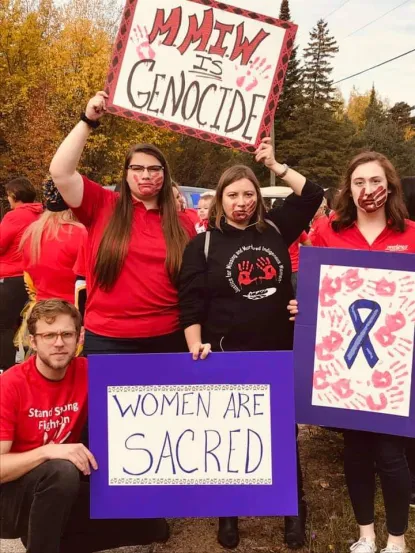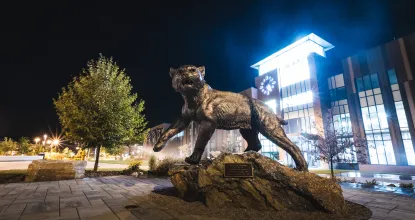
The Mino-bimose’idiwag project, led by the Social Work Department and the Center of Native American Studies, addresses barriers and advances higher education for Native students by providing support, fostering connections, creating internships, and facilitating trainings in rural tribal communities. Additionally, it emphasizes the needs of crime victims in Indigenous communities, with a specific focus on Great Lakes Indigenous perspectives.
The mission for Mino-bimose’idiwag is to empower victim services in rural Tribal nation communities by fostering a critical understanding of Indigenous ways of knowing and engaging supportive pathways to higher education
Is there a need? Yes.
Retaining qualified victim advocates in rural reservation communities is immensely challenging. The combined barriers of limited access to higher education, financial costs, the need for further training in victim service, and in-depth competence in culturally sensitive practice make it challenging for several Tribally Run Victim Service Programs (TRVSPs) in the UP to hire and maintain qualified staff.
Domestic violence programs are seeking to place skilled and caring advocates in rural Indigenous communities. Successful advocates will embody cultural humility and engage in culturally inclusive approaches.

Circle of Being Workshop with Marlene Syrette
Join us on Friday, February 20th, from 9 am - 3 pm for an immersive workshop surrounding the seven grandfathers' teachings!
Marlene Syrette is an Ojibwe Anishinaabekwe of the Wolf Clan from Batchewana First Nation. A cultural educator grounded in Anishinaabe Aadziwin, she actively participates in ceremony and cultural teachings across Anishinaabe-Akiing. Her background includes Visual Arts, Therapeutic Crisis Response, and extensive work in cultural education and child welfare.

WPT Interns and Fellows will:
Understanding the challenges and engaging in cultural humility are both required for meaningful advocacy work.
- Foster positive connections in their community through collaboration with clients, other agency employees, and fellow interns.
- Continue to grow their interpersonal and communications.
- Demonstrate effective and reflective writing.
- Collaboratively design and complete a practical learning plan with the support of their agency supervisor and instructor.
Addressing the Challenges:
The three critical challenges addressed through the WPT are:
| The region's rural nature creates distance between tribes and major universities with accredited programs. | The importance of remaining connected to communities of origin for Native American students | Financial barriers are exacerbated by poverty and economic disparities that are endemic in rural Native American communities. |
WPT Benefits:
Non-Credit Bearing Internship | Credit-Bearing Internship | Victim Services Specialist Fellowship (BSW and MSW Field Placement) | Additional Training Opportunities |
| This program path is specifically designed for individuals interested in victim services or seeking further training in this field. It includes a combination of training sessions, supervised job shadowing opportunities, and a service-learning project. The program offers flexibility in content and completion requirements to accommodate diverse backgrounds. | This program path resembles a non-credit-bearing internship but offers additional assignments to support undergraduate course credit. Interns enrolled in this program earn four credits toward their undergraduate degree while actively contributing to the pursuit of an associate or bachelor’s degree. By engaging in meaningful assignments and practical experiences, participants not only gain valuable skills and knowledge in their field of interest but also make tangible progress towards their academic goals. | This program path fulfills the generalist practicum requirements for Bachelor of Social Work (BSW) or Master of Social Work (MSW) degrees at NMU. It aims to address financial challenges and enhance accessibility to higher education by offering a culturally grounded, hands-on, experiential internship opportunity within a regional tribal victim services organization. Through this immersive experience, participants not only meet academic requirements but also gain invaluable insights and skills in serving tribal communities, contributing to their personal and professional growth while making a meaningful impact in the field of social work. | Mino-bimose’idiwag will host professional development workshops for students and regional professionals provided by qualified, established, and culturally relevant consultants. Regional tribal service agencies will be able to share opportunities to recruit NMU students for field placements or employment. |
Additionally, stipends are available to assist with travel and subsistence expenses.
Contact Us
| Social Work Department | Center for Native American Studies |
| 2400 Suite Jamrich Hall | 112 Whitman Hall |
| 906-227-1105 | 906-227-1397 |
| wpt@nmu.edu | cnas@nmu.edu |
Land Acknowledgment
Northern Michigan University is located in beautiful Marquette, Michigan, upon the ancestral homelands of the Anishinaabe Nation. Anishinaabe people are among the First Peoples of the Great Lakes. Marquette is known to the Anishinaabe as Gchi-namebinin Ziibing, which refers to a life-sustaining river.
Special thanks also to the Hannahville Indian Community, Bay Mills Indian Community, Keweenaw Bay Indian Community, and Sault Ste. Marie Tribe of Chippewa Indians.
